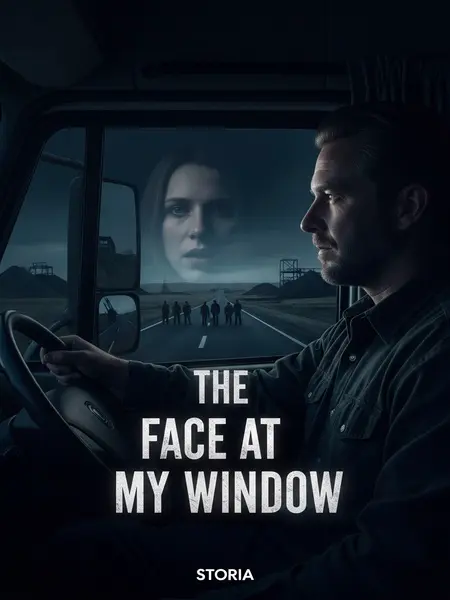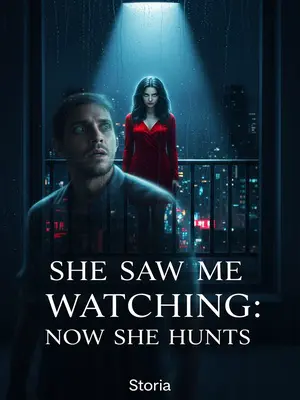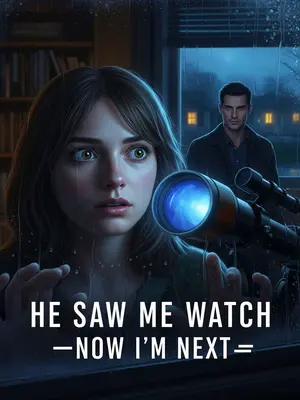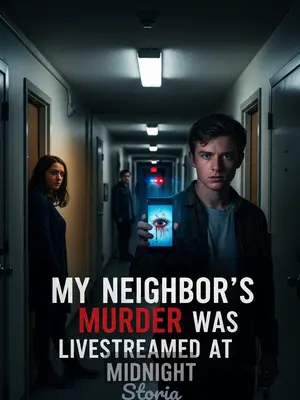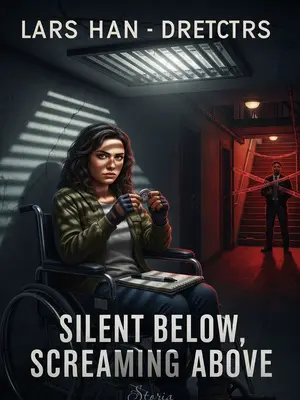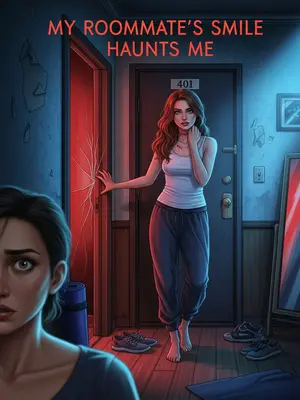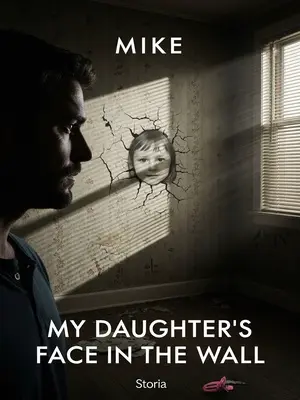Chapter 2: The Hungry Thing by Moonlight
Tyler rubbed his eyes and said, “I wasn’t feeling well tonight, so Dave went to watch the truck for me.”
He coughed, pulling his blanket tighter. “Said he’d take my shift, let me get some rest.” I nodded, already backing away.
Hearing that, I hurried outside.
The night air was colder than before, biting at my cheeks. I could see my breath, clouds of steam in the moonlight. The parking lot was silent, trucks lined up like sleeping beasts. My boots crunched on the gravel.
It must’ve been late—the pale moon hung in the sky, making everything look white.
The whole world seemed washed out, shadows long and sharp. Even the stars looked cold, blinking in the black sky. I hugged my jacket tighter.
Northern nights are eerily quiet—vast and empty. Except for the wind howling over the prairie, there’s no other sound.
The kind of quiet that makes you feel small, like the land could swallow you whole and nobody would ever know. Every step crunched loud on the gravel, echoing in the emptiness. I felt eyes on my back.
I walked past a few stone houses to where we parked the trucks.
The rigs loomed in the moonlight, hulking shadows. I kept my whip close, eyes scanning the darkness for any sign of movement. My heart thudded in my chest.
To prevent coal theft, we left someone in almost every truck.
It was standard practice—nobody wanted to lose a load. But tonight, the lot felt deserted, like everyone had vanished. I moved faster, nerves jangling.
But maybe it was too late and everyone had fallen asleep, or something else was going on.
I checked the cabs—windows fogged, doors locked tight. No sign of life, not even a flicker of a phone screen. My mouth went dry.
As I got closer, I didn’t see a single phone light.
Usually, someone would be scrolling through Facebook or texting home. Tonight, nothing—just darkness and the faint hum of cooling engines. It felt wrong.
When I reached Dave’s truck, I suddenly heard a faint voice.
It drifted on the wind, thin and hungry. My skin crawled, every instinct screaming at me to run, but I forced myself forward. I gripped the whip tighter.
It was small and thin, like: “Hungry... so hungry... hungry.”
The words slithered through the night, barely more than a whisper. I felt the urge to bolt, but I kept moving. My breath came fast and shallow.
I rushed to Dave’s truck and saw a pale shadow leaning against the driver’s window.
The shape was long and thin, almost boneless, legs sticking straight out. The face was pressed flat against the glass, mouth moving silently. I froze, whip raised.
Its legs were straight, body long and thin, face pressed tightly against the glass.
It looked like something out of a nightmare—skin stretched too tight, eyes rolling in their sockets. I could see the breath fogging the window, leaving streaks in the frost. My stomach clenched.
I didn’t get a clear look at what it was—I just lashed out with the whip!
The sound cracked through the night, sharp as a gunshot. My arm moved on instinct, muscles remembering a hundred practice swings. My hand stung with the force.
A crack in the air!
The thing jerked, startled. Its head snapped around, mouth opening wide in a silent scream. My blood ran cold.
The thing seemed startled and suddenly turned its head.
I caught a flash of its face—eyes wide, lips peeled back. For a heartbeat, I thought I saw Dave’s features twisted in terror. My mind reeled.
I was shocked!
My mind raced, trying to make sense of what I was seeing. Was it really Dave, or just some trick of the moonlight? My knees felt weak.
For a second, I thought I saw Dave.
The resemblance was uncanny—same nose, same jawline. But the skin was wrong, stretched and shiny, like a mask pulled too tight. I swallowed hard.
The features on that face really looked like him.
It was as if someone had pressed Dave’s face into wet clay and let it harden, every detail exaggerated and grotesque. My breath came in short gasps.
But the skin was all wrong—no pores or texture, just smooth like a blown-up balloon.
It looked fake, almost plastic. The eyes were glassy, unfocused, the mouth working silently. I wanted to scream.
Afraid it might hurt Dave, I whipped at it again.
This time, I aimed lower, trying to drive it away from the cab. The whip snapped, echoing across the lot. My hands shook.
But it instantly dropped to all fours, head bent back, crawling under the truck like a spider—fast.
The movement was unnatural, joints bending the wrong way. It scuttled under the truck, disappearing into the shadows before I could blink. My heart hammered in my chest.
I chased it around the truck, but it disappeared without a trace.
I circled the rig, whip at the ready, but there was nothing—just the sound of my own breathing and the wind. The night felt colder.
I hurried back, opened the door, and saw Dave slumped in the seat, face pale, looking like he couldn’t breathe, lips purple.
He looked dead—head lolled back, eyes rolled up. My heart dropped. I shook him hard, yelling his name. “Dave! Dave, wake up!”
I called his name twice, but he didn’t wake up, so I pressed the spot under his nose.
It was an old trick—pressure point just below the nose. I pressed hard, hoping for any sign of life. My hands trembled.
Dave suddenly gasped for air and opened his eyes.
He sucked in a huge breath, chest heaving. His eyes darted around, wild and confused. Relief flooded through me.
After he caught his breath, I asked what happened.
He wiped his mouth, voice trembling. “I... I don’t know, Mike. I just remember being so tired...”
Dave, still shaken, said, “Mike, I don’t know if I was dreaming or not. I just wanted to nap for a bit, but as soon as I closed my eyes, I heard someone knocking on the truck, saying he was hungry and asking if I had food.”
He looked at me, eyes wide with fear. “I thought it was one of the guys, maybe Tyler, so I said sure, I’ve got some jerky. But then I saw this face... rising up under the window.”
“I said yes, was about to get it, when I caught a glimpse of a pale face rising up under the window.”
He shivered, wrapping his arms around himself. “It was right there, Mike. Right up against the glass.”
“I turned to look and nearly jumped out of my skin.”
He tried to laugh, but it came out as a sob. “I’ve never been so scared in my life.”
“That thing didn’t even look like a human face—more like a flat pancake! The features were all sunken, but the mouth could move, still talking.”
He mimed the motion, lips moving silently. “It kept saying it was hungry, over and over. The mouth just kept stretching wider.”
“Then my head went fuzzy and I blacked out...”
He looked at me, pleading. “You believe me, right? I’m not losing it?”
I comforted Dave and sent him back to the stone house to rest.
I gave him my jacket, helped him inside. “Get some sleep,” I said. “I’ll keep watch.” He nodded, still shaking, and disappeared into the darkness. I watched him go, then turned back to the trucks.
Then I went back to the parking lot.
The wind had picked up, rattling the truck doors. I walked a slow circle around the rigs, listening for anything out of place. My nerves were shot.
I checked around Dave’s truck again, but didn’t see anything strange.
No footprints, no sign of forced entry. Just the lingering sense that something was still out there, watching. I kept my whip close.
But I did find a weird dark stain near the rear wheel.
It was sticky, almost tar-like, and the color was off—too dark, too thick. I crouched down, flashlight sweeping over the gravel. The hairs on my neck stood up.
I bent down and caught a whiff of a strong, fishy stench.
The smell hit me like a punch—rotten, salty, unmistakable. I gagged, covering my nose with my sleeve. I nearly lost my dinner right there.
Did Dave run something over? Or pick something up somewhere?
I checked the tires for blood, fur, anything that might explain the smell. Nothing. The stain seemed to have seeped up from the ground itself. I shook my head, baffled.
I was puzzled, since it’s really hard to smell anything like rotten fish in the dry northern plains.
The air out here is usually clean, crisp. That stench had no business being here. It made the hair on my arms stand up. I spat on the ground, trying to clear the taste from my mouth.
I washed the stain off with water, then took Dave’s shift on the truck for the night. Nothing else happened.
I sat in the cab, whip across my lap, eyes glued to the mirrors. The hours crawled by, but nothing moved except the wind. By sunrise, I was stiff and exhausted, but grateful for the quiet. I stretched, feeling every mile in my bones.
The next day, before we set out, we ran into Frank’s crew again.
They were already up, milling around their trucks, laughing too loud. The old man stood apart, jar clutched tight, eyes on me the whole time. I kept my distance.
Frank looked at me with a grin and asked, “Mike, sleep well last night?”
He leaned in, voice oily. “Heard there was some excitement. Hope you didn’t lose any sleep.” I just smiled back, not giving him anything.
“Pretty good,” I replied.
I kept my tone light, but my eyes stayed on the old man. He didn’t blink, just tightened his grip on the jar. I felt a chill run down my spine.
Then I saw that old man again, holding the small black jar in both hands.
He muttered something under his breath, rocking back and forth. The jar seemed to suck in the light, darker than anything around it. I looked away, pretending not to notice.
When he noticed me looking, he covered the jar with his sleeve.
He shot me a look—half warning, half challenge. I looked away, pretending not to notice. My palms were sweating.
“Mike, I filled the water!”
Tyler ran over with the kettle, and Frank seemed to freeze for a moment.
Frank’s grin faltered, and he watched Tyler like he expected him to say something else. The air felt charged, like a storm about to break. I braced myself, but nothing happened.
But he didn’t say anything, just turned and left.
He snapped at his crew, and they fell in behind him, the old man bringing up the rear. I watched them go, unease twisting in my gut. I shook it off, trying to focus on the job.
We delivered the coal to Silver Ridge train station, spent the night, and rushed back to the mine.
The drive back was tense—nobody talked much. We unloaded quick, grabbed some food at the station diner, and tried to sleep. The beds were hard, but nobody complained. I dreamed of black faces pressed against the glass.
The mine had overnight dorms for us truckers, in the same building as the miners’ dorms.
The building was old, paint peeling, but the heat worked and the showers were hot. We bunked two to a room, grateful for a roof over our heads. I unpacked, trying not to think about the night before.
But this time, I could feel something was off at the mine.
The air was heavy, like a storm coming. People moved quieter, eyes downcast. Even the foreman seemed on edge, snapping at anyone who lingered too long in the halls. I kept my head low.
At dinner, we asked an old miner we knew and found out that while we were on the road, more weird things had happened at the mine.
The mess hall was crowded, the smell of beef stew and stale bread thick in the air. We found Old Garrison at his usual table, hunched over a bowl, eyes darting around. He nodded at us, voice low.
The miner’s last name is Garrison—we all call him Old Garrison. He’s worked here seven or eight years.
He had the look of a man who’d seen too much—wrinkles deep, hands calloused, eyes sharp as a hawk’s. He nodded as we sat down, pushing his bread across the table. “Heard you boys had a rough night,” he said.
He’s from our hometown, so we hit it off quickly.
We swapped stories about home—football games, county fairs, the way the leaves turned gold in the fall. It made the mine feel a little less lonely. Garrison always had a story to tell.
Old Garrison quietly told us, “They found a coal husk down in the shaft—several people saw it.”
He leaned in, voice low. “It was down in the third shaft. Miners say it was black as pitch, shaped like a man, but wrong somehow. Gave everyone the willies.”

